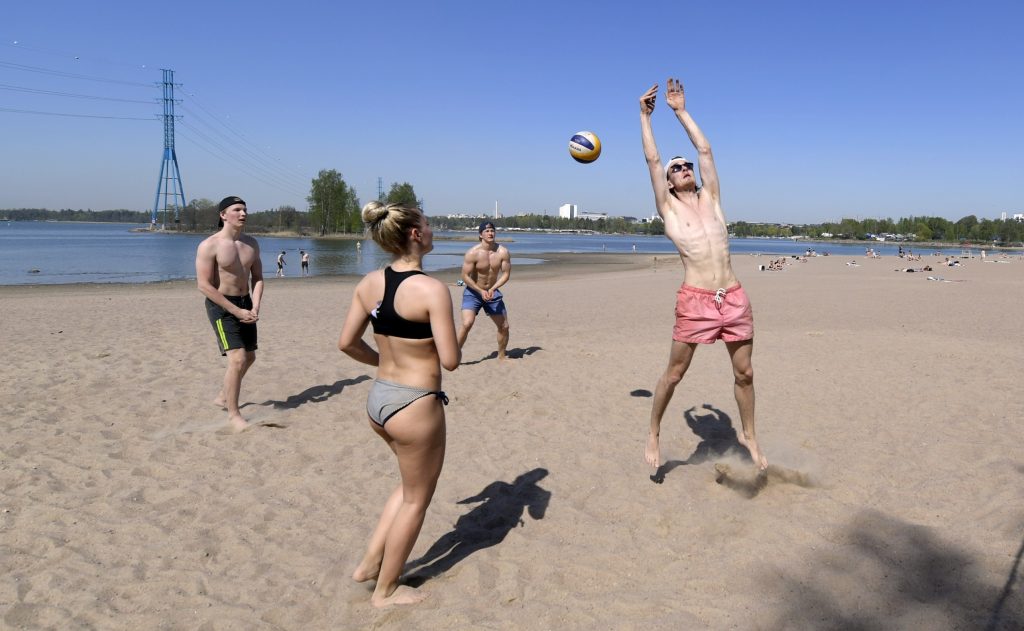Researchers identify ideal temperatures for Finns

The unseasonal warmth is on the lips of anyone who has lived in Finland long enough to realise that the current conditions are not typical at this time of year. It is especially attention-grabbing given the very cool weather that preceded it.
Very exceptionally, this week Finland has seen the highest temperatures across Europe, with temperatures verging on the 30 degree mark in some areas, which is considered sizzling hot in this climate.
Experts who write about the health implications of warm weather often stress the risks associated with rising mercury. Professor Hannu Rintamäki of the Finnish Institute of Occupational Health, TTL, previously told Yle how Finns adapt to the heat in different ways.
TTL special researcher Sirkka Rissanan pointed out that the most comfortable temperature for Finns is 14 degrees Celsius. At that level, incidents of death and health problems are lowest.
Heat warms up muscles
Like the lubricant in an engine, people’s tissue fluids help make movement easier when it’s warm. Physical performance improves when muscle and nerve tissue are warmer. People feel that they are much more agile in summer weather than in the depths of winter in January.
However, the comfort limit for physical exertion is 28 degrees Celsius. Beyond that temperature, people involved in physical activity should take breaks more frequently and rest in a cool place. They should also take greater care to protect themselves from the burning rays of the sun as well as from UV radiation.
Better mood, better performance
As light increases in spring after the darkness of winter, it affects people’s moods. However instead of benefitting from the impact of sunlight through the skin, many Finns opt for vitamin D pills.
University of Jyväskylä sports physiologist Heikki Kyröläinen said that he recently read research about testing performance among runners. Some members of a large test group were given more vitamin D. They performed better than their peers in a control group, he noted, adding that the difference was small, but still noteworthy.
Different ways of adapting to heat
Kyröläinen’s group also tested Finnish peacekeepers during an assignment in Chad in 2007. Soldiers who appeared to be better able to cope with hot conditions were selected for the mission. The professor said that in this regard, there are major differences in terms of how people adapt to heat.
During a four-month monitoring period, the test group of peacekeepers maintained a high level of endurance and they shed weight, but there was no noticeable difference in their testosterone or cortisone levels.
“It would have been interesting to find out whether their endorphin levels – their mood hormones – changed in a testing situation”, Kyröläinen speculated.
Endorphins are the human body’s mood regulators, triggering a positive feeling and reducing the perception of pain. Their structure and impact are similar to that of morphine.
No one has yet studied the impact of May’s temperature surge in Finland, but taking into consideration the combined effect of light, heat and vitamin D, people should feel good about the current circumstances.
Better physical performance combined with light and heat should make people feel better, as long as they are in reasonable health and are not suffering from any serious ailments. However, for people suffering disruptions of the thyroid or heart disease the heat could spell trouble.
Related stories from around the North:
Canada: Even with its massive water resources, Canada is not immune to dramatic droughts, Radio Canada International
Finland: Finland hit by worst birch pollen season in years, Yle News
Germany: While Arctic melts, sweltering Germany hosts UN climate talks, Deutsche Welle’s Iceblogger
Norway: As Arctic weather dramatically changes, world meteorologists take on more joint forecasting, The Independent Barents Observer
Russia: Record heatwave in the Arctic, The Independent Barents Observer
Sweden: Preserving biodiversity in Sweden’s shrinking natural forests, Radio Sweden
United States: Rapid Arctic warming is increasing the frequency of blizzards in U.S. Northeast: study, Radio Canada International



